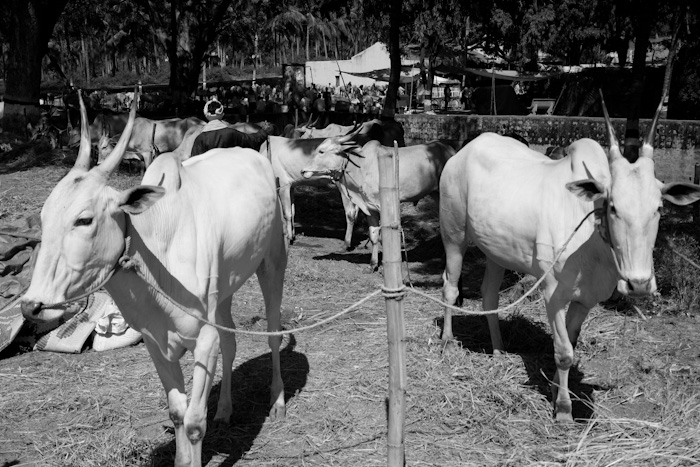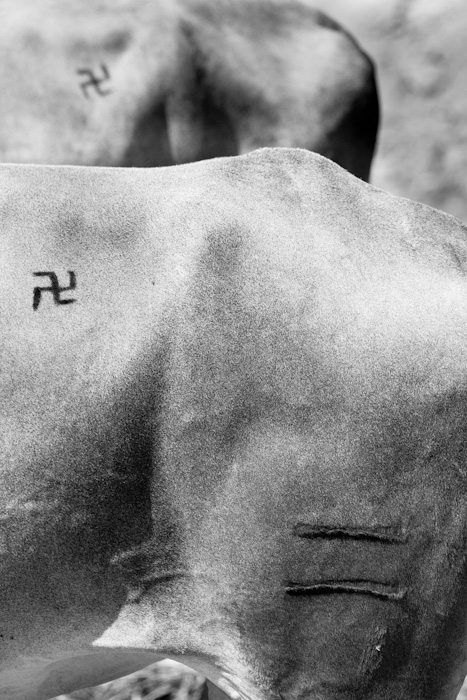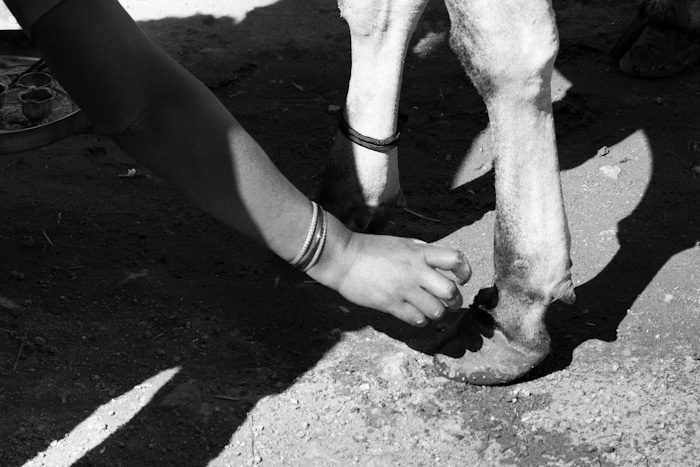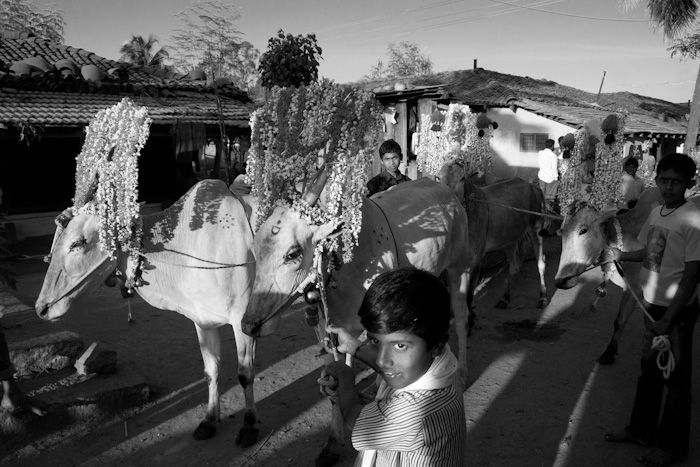
Makar Sankranthi is another big festival where one can see the true affection between the farmer and his beloved cattle in India , especially south India. A farmer ploughing in his field with his oxen tied to a metal or wooden plough is the most common scene imagined by artists and even a common man while thinking of a agriculture, farms, farmer etc in India. If you visit in and around Bangalore, Mandya , Mysore , Chamarajnagar during this festival one can see another face of farmers decorating and worshiping their cattle. It is the love and affection face! All the cattle are given rest for the entire week and worshipped . They are taken in to a procession and the whole atmosphere during these days turns out to be a big fair like event. In some areas some sports are conducted which involves cattle and in some villages a big cattle fair is held.
Makar Sankranthi signifies the movement of Sun in to Makara Rashi (capricorn) . Traditionally it has been a harvesting season most part of the India. To understand the astrologic significance of the this festival you better follow Wikipedia link here (which never went in to my head at all! but something very science ). This festival unlike any other festival in India falls exactly on 14th Jan of every year. In many parts of India it is celebrated with distinct names and ways . The wiki link should give you enough reading on that.
The cattle fair in Ramnagar
I went to Mandya( 100 Kms from Bangalore) last year after listening to a villager that Sankranthi is celebrated in Mandya in a big way. So as usual I asked my good student and assistant Chandra to accompany me and had some memorable time watching those celebrations. On the way to Mandya , Ramnagar ( 50 kMs from Bangalore) cattle fair came as surprise stop. Farmers come from different places and bring their cattle to sell them or exchange. Farmers take care of their calf as if their own child so that it gets a best market price. Market value is also dependent on color, fitness, horns etc.


The breed mostly found in these area (Bangalore, Hassan, Mandya, Mysore , Kolar, Chitradurga ) is called Hallikar (http://eng.gougram.org/breeds/) and when it is of a year old it is ready to be sold or exchange. The health and the body is most observed aspects when buying a calf. The horns can also make huge price difference of rupees in selling price. For a good looking Hallikar young calf the horns should be symmetrical, bent backwards in a perfect manner. But when a new horn is born on a calf’s head it is soft and easily bent in different shape when calf uses in a odd manner. So after full growth of the horn it might lose its beauty if left unattended. So the farmers follow a unique technique to make the horns look better. There will be an expert in the villages who breaks the horn in the middle and tie them together using a particular technique which he mastered. As the horn grow stronger it gets the correct shape thus it becomes permanent so we have a handsomely looking young calf ready to serve! The prices start from Rs16, 000 and it goes up to Rs50,000 for one Calf.

The cattle Procession in a village in Mandya
Then we went to a small village near Mandya called Induvalu . There was no particular reason to go there. I just wanted to see the entire procession involving the cattle in a village. The villagers were most happy to receive me after looking at my gear, big bags and tripods. All the houses painted and decorated with flowers. There was huge gathering of relatives and friends everywhere. Kids were extraordinarily active playing and running around. Girls were so careful about their new dresses and that showed how difficult it was to get them from their parents. Boys were as usual holding big oxen and trying to impress girls. All adults wearing new white cotton and silk dresses and everyone looked like landlords.

Soon the procession started with two very very huge ( well, really huge ) oxen and many small oxen behind them. I found out later that these two oxen belonged to a temple. They cost Rs 5,00,000 ( $10,000) each and they need extra care and a real heavy food. The oxen along with senior villagers, budding young politicians went to every house in the village and the women would come out to worship the oxen with oil lamps, flowers and fed them bananas , apples and grass.



Then there was a small photo session and video session before the procession stops at next door. The procession went on till evening non-stop. We almost went to every one’s house front and not to forget we enjoyed the villager’s tender coconut treat in between as well. Occasionally I had to shoot some happy family pictures after some people confused me for a studio photographer ( which is quite common in India and I do not resist that, the painful thing is writing those addresses and then sending the hardcopies, but recently thanks to technology I can send to their mobile phones). These are some moments I captured during the day and I think the pictures are mostly self-explainable.





The fire
In the evening there was a big bonfire set by villagers after a pooja in a nearby temple. Believe me that was big, huge and wondered how the poor animals can cross ? Then surprisingly they started running across as if they are doing it daily and villagers behind also started jumping over the bonfire bare foot !But for some oxen were really scared and they ran off the track in the crowd. The crowd surrounding which included men and women of all age , children cheered all the along as the pairs of oxen crossed the big wall of fire! some brought their all the cattle and made them to jump the fiery fire! I literally saw some youngsters bringing their sheep across the fire and their hair catching fire and then the villagers throwing their shirts and towels on them!!It was real fun as nothing bad happened .One can think animal rights people might get offended but this is India right ? even animal rights people are non-vegetarian here sometimes!!



Once this event finished headed straight to Mandya city stadium The stadium was heavily crowded as if there is a big cricket match going on! As the guests for the events arrived a huge bonfire was lit and the gathered farmers made so many cattle cross it. Once animals finished most of the people in the stadium started crossing and it was a chaos everywhere. Some photos I captured were exactly like a war photos with people running everywhere and buildings burning around them!!! So for those who do not want to go to villages they can visit the Mandya stadium and man, I have to tell you , the fire they put was huge ! Anyway it was total fun!


Important
It was amazing to see how man-animal relationships are celebrated in such a way! It was also amazing to see the ideas, the culture behind all these celebrations. Some senior educated guy told me this fire-o-mania is a result of intelligent thinking by our ancestors! Oxen are used throughout the year for farming and once this farming season over farmers start cleaning the cattle shed. Cattle are cleaned to get rid of bugs and any diseases if any. In those days ( some places even now ) fire was used to remove all the bugs and soon this became a part of a celebration during Sankranthi! He also told that as this festival set as a platform for their kids to learn how to respect their cattle and how to take care of their cattle. How interesting isn’t it ?
Ok something on Photographing this event :
- Respect villagers, villages. Wear a smile always , be careful where not to wear a shoe or a chappal as some places are considered as sacred.
- Try to learn the story, culture behind it .Ask the senior people who are ready to explain everything happily.
- Be very careful while capturing in fire as some animals get mad and run without control! you and your expensive gear might come their way!
- Sometime the bonfire will get so huge that in fraction of second you might get burns and your gears might get fire! so keep watching not just through the viewfinder.
- Always keep a first aid, food and a bottle of water.
- Have fun!
2 Comments
Comments are closed.
[…] ( taken from my old article here ) […]
[…] Here is a post explaining one of such fair . […]